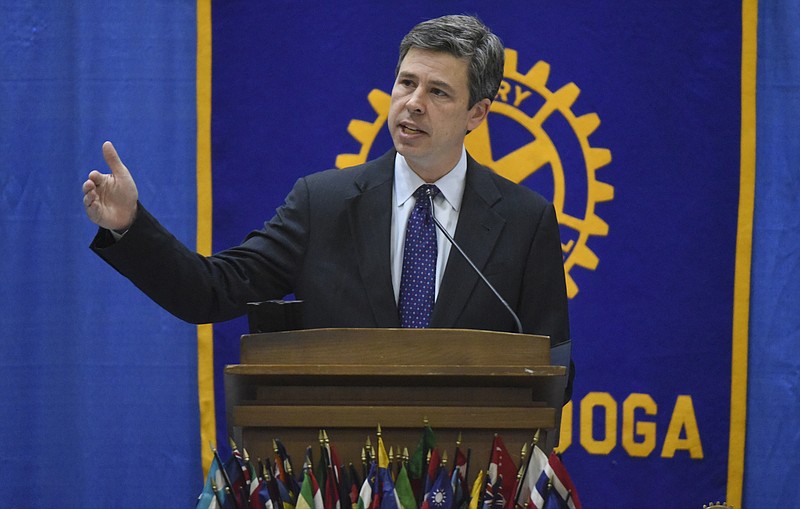I have used Whatsapp in the past. I do not currently use Whatsapp to communicate with them [his staff].
Chattanooga Mayor Andy Berke and City Attorney Wade Hinton on Monday said they've both used encrypted smartphone message applications to communicate government business.
The app they used, Whatsapp, is an encrypted messaging platform that only allows message senders and recipients to store messages and phone calls. Unlike an email sent using the city's email server, Whatsapp does not store messages sent by its users.
Concerns over text communications by Berke and his senior staff arose after a domestic incident involving adviser Lacie Stone and her husband, Bobby. Bobby Stone has alleged his wife was having an affair with Berke, who has denied the claim.
On Monday, Berke asserted the usage of Whatsapp or similar technology does not run counter to his administration's commitment to transparency.
"I have used Whatsapp in the past," Berke said. "I do not currently use Whatsapp to communicate with them [his staff]. We communicated with it and sent messages that have government business on them and comply with our [open record] responsibilities, just like our text messages."
Berke did not explain why members of the city staff used encrypted messaging as opposed to regular text messaging or offer an explanation as to why he quit using Whatsapp.
"As to my understanding, most cities have no policy about text message and electronic communication," Berke said. "We've put forth a policy that says exactly what [city employees] have to do. So in most places, you could delete the next day. We don't do that. We try to go above and beyond by putting forth a policy that says what we need to do."
City record and information policy adopted in December 2015 calls for the retention of chat messaging for 60 days.
Hinton said the policy calls for users to download content to city servers if it falls into a number of categories, citing a business contract as an example. Correspondence associated with the document should be downloaded for longer storage if it includes material associated with changes or requests concerning the contract, but not necessarily if the correspondence was only about about whether it had been completed, he said.
Now, no one provides oversight to ensure city employees comply with the policy, Hinton said. So far, he has received no information indicating any employee has violated the retention policy, he said.
The city is undergoing a comprehensive overhaul of its record retention policies, he said, citing plans to consider how best to possibly refine digital record retention efforts.
Marissa Bell, the city's communications coordinator, said in an email that city employees "have the right to use any app they choose on their personal phones," but city business conducted on a personal wireless device is subject to inspection.
Deborah Fisher, executive director of the Tennessee Coalition for Open Government, said government record policies should focus more on content than the media method itself.
"Memos, letters and emails tend to fall into different categories," Fisher said, citing the need to balance retention of pertinent documents for the public to "know what government is doing" with the disposal of "transitory records" that may not further that objective. Properly managing what records to keep is a key factor to ensuring a good policy that achieves that, she said.
The City of Knoxville has no record retention policy concerning text messaging, according to Jesse Mayshark, communications manager for Mayor Madeline Rogero's administration.
"Our administrative rules do not authorize text messaging as a vehicle to conduct city business," Mayshark said in a phone message. "We think city business should use a venue easily archived and searchable."
Regardless, the city could still ask for text messages if included in part of a open records request, Mayshark said.
Contact staff writer Paul Leach at 423-757-6481 or pleach@timesfreepress.com. Follow on Twitter @pleach_tfp.

